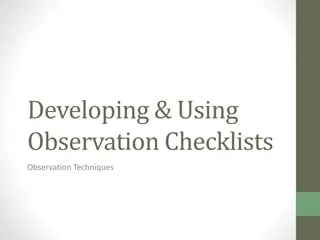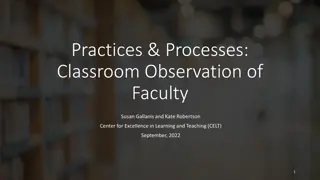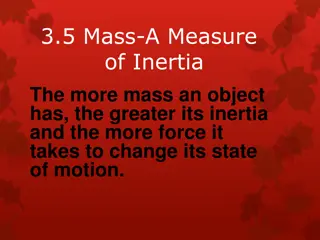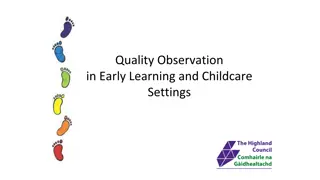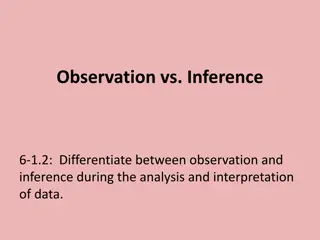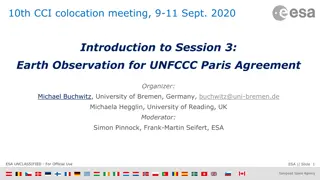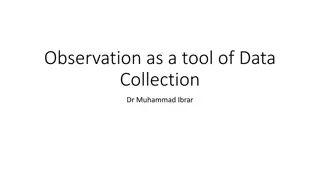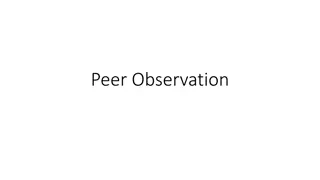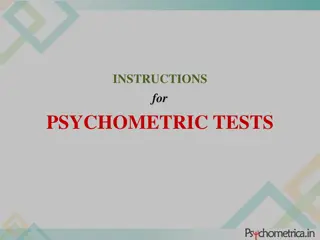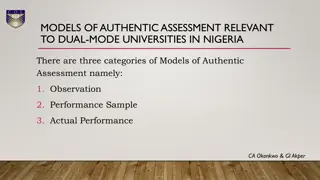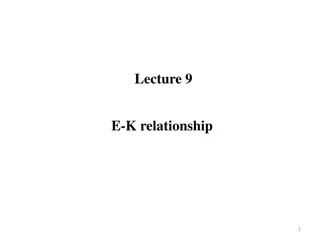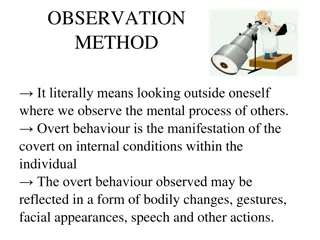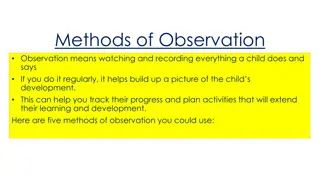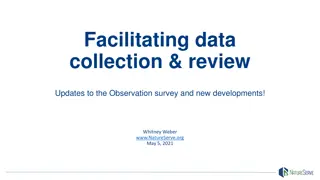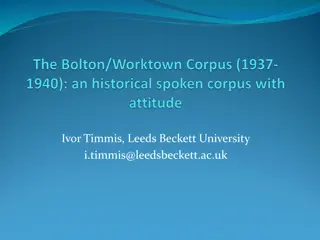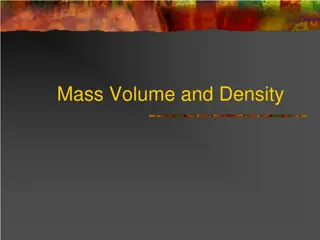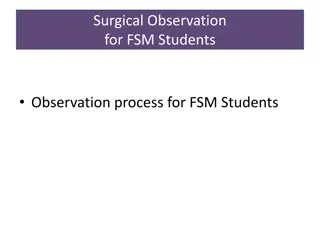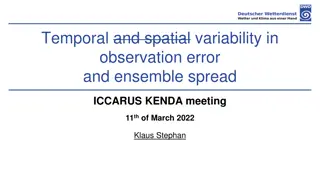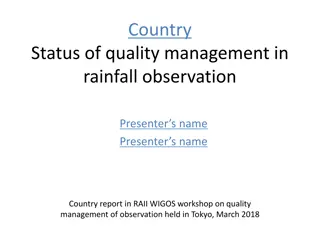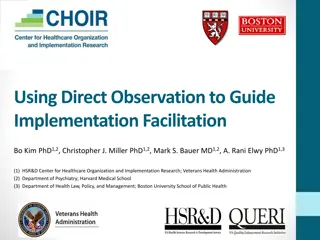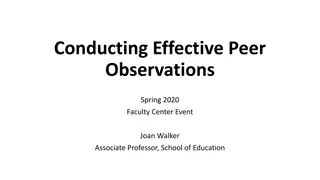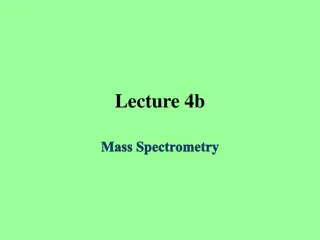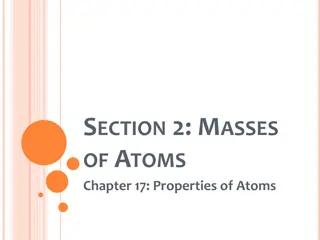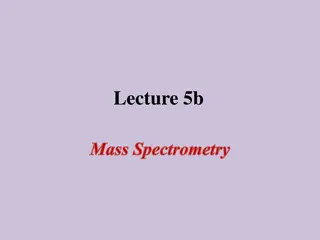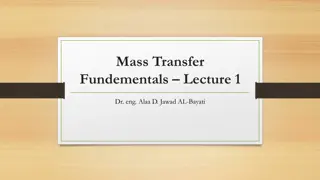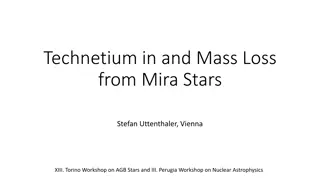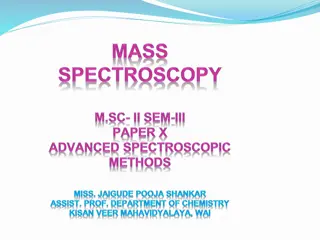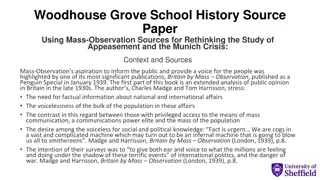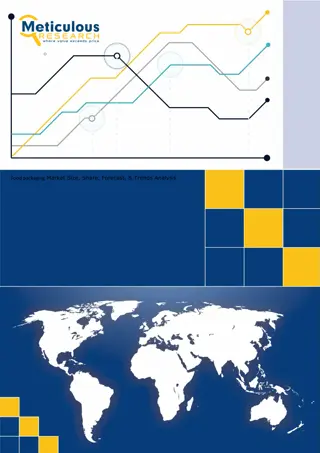Understanding Mass Media and Communication for the Academic Year 2020/2021
This content delves into the science of media, communication, and mass communication for the academic year 2020/2021. It explores the role of mass media in public communication, the characteristics of mass media, and the various types of mass media such as books, print media, films, radio, televisio
8 views • 11 slides
Teaching Observation Process and Best Practices
Explore the teaching observation process with a focus on fostering faculty success and improving teaching practices. Learn about pre-observation meetings, separating observation from evaluation, and utilizing observations to spark dialogue about effective teaching. Access resources such as the Teach
7 views • 20 slides
Unveiling the Best Mass Gainers in India for Maximum Muscle Growth
Discover the ultimate solution for achieving your muscle-building goals with the best mass gainers available in India. Our comprehensive guide delves into the top-rated products designed to support your mass gain journey effectively. Whether you're a beginner or a seasoned fitness enthusiast, these
6 views • 1 slides
Unsheltered Homeless PIT Count Volunteer Training using Mobile App
The volunteer training for the January 25, 2024, Unsheltered Count involves using a mobile app for observation-only surveys. Training materials are based on HUD guidance and feedback from those with lived homelessness experience. Volunteers will be assigned locations to canvas and conduct surveys us
0 views • 7 slides
Using Observation Checklists for Effective Research
Observation checklists are valuable tools in research, allowing for quick and systematic data collection while maintaining objectivity. They help researchers focus, remain objective, and ensure thorough data coverage. Specificity in checklist design is crucial for capturing nuanced behaviors. The ch
0 views • 6 slides
Classroom Observation Practices and Processes at CELT
Classroom observation practices and processes at the Center for Excellence in Learning and Teaching (CELT) involve faculty observations, formative and summative evaluations, and the utilization of the Teaching Observation Form. Observations are conducted by various stakeholders to promote effective
1 views • 16 slides
Understanding Mass and Inertia in Physics
Mass and inertia are fundamental concepts in physics. Mass is the amount of material in an object, determining its inertia - the resistance to change in motion. Objects with greater mass require more force to change their state of motion. Mass should not be confused with volume or weight, as they ar
0 views • 21 slides
Gas-Liquid Equipment in Mass Transfer Operations
Gas-liquid operations play a crucial role in mass transfer processes by facilitating intimate contact between the two fluids for efficient interphase diffusion. Various equipment such as sparged vessels (bubble columns) and mechanically agitated vessels are used to disperse gas or liquid phases, pro
2 views • 27 slides
Exploring Quality Observation in Early Learning Settings
This session delves into the significance of observation, interpretation, and documentation of learning in early childcare settings. It discusses the Realising the Ambition approach, emphasizing the planning cycle, reflective practices, and understanding children's interests and development. The imp
0 views • 36 slides
Understanding the Difference Between Observation and Inference
Learn to differentiate between observation (direct facts or occurrences) and inference (interpretations based on existing knowledge or experience) through examples such as the Sun producing heat and light (observation) and a dry, itchy skin leading to the inference that it is dry. The distinction be
2 views • 14 slides
Earth Observation for UNFCCC Paris Agreement Meeting
Introduction to Session 3 of the 10th CCI Colocation Meeting on Earth Observation for UNFCCC Paris Agreement. The session covers presentations, breakout sessions, and discussions on how Earth Observation can support the implementation of the Paris Agreement through case studies and future research d
2 views • 7 slides
Understanding Observation as a Data Collection Tool in Behavioral Science
Observation method serves as a crucial tool for data collection in behavioral science, enabling researchers to systematically record and analyze observable phenomena. This method involves recording behavior patterns without direct interaction, providing in-depth insights into natural settings and in
0 views • 12 slides
Enhancing Peer Observation for Professional Development
Explore the purposes and challenges of peer observation, learn strategies to implement effective peer feedback, bridge institutional requirements with developmental goals, and foster a culture of collaboration in teaching practices. Discover a framework for constructive dialogue, evaluate learning e
2 views • 12 slides
Psychometric Tests Overview: MAP, SPM, Observation Test
Explore three different psychometric tests - Multi-Dimensional Assessment of Personality (MAP), Standard Progressive Matrices (SPM), and Observation Test. MAP assesses personality dimensions, SPM measures intelligence through abstract reasoning, and the Observation Test evaluates your power of obser
4 views • 14 slides
Models of Authentic Assessment in Dual-Mode Universities in Nigeria
Three categories of Models of Authentic Assessment relevant to dual-mode universities in Nigeria include Observation, Performance Sample, and Actual Performance. The Observation model involves assessing students based on performance and attitude, the Performance Sample model evaluates tangible resul
0 views • 27 slides
Understanding Experiments in Research: Observation vs. Experimentation
Observation and experiments are two crucial methods in research. An observational study involves observing and measuring variables without influencing responses, while an experiment deliberately applies treatments to measure responses. Confounding variables can affect the results, and factors like e
0 views • 13 slides
Understanding Effective Mass in Crystals: Insights and Applications
The concept of effective mass in crystals delves into how electrons interact with the lattice potential, leading to altered particle masses that affect their behavior. This phenomenon is crucial in applying electrodynamics equations to charge carriers in solids, where the electron mass can differ fr
0 views • 18 slides
Understanding Observation Methods in Psychology
Observation method in psychology involves looking outside oneself to observe the mental processes of others. It includes types such as participant and non-participant observation, structured and unstructured observation. Steps in the process include planning, execution, interpretation, and reporting
2 views • 10 slides
Effective Child Development Observation Methods
Observing children is a crucial aspect of tracking their development. Naturalistic Observation, Event Sampling, Snapshot Observation, and Non-Participative Observation are effective methods outlined in the content. These methods help in capturing a child's behavior, interactions, and progress, aidin
3 views • 7 slides
Enhancements to Observation Survey for Effective Data Collection and Review
Leveraging the latest updates in Observation Survey v1.4, this tool facilitates the collection and review of observation data seamlessly. From utilizing standardized data models to enabling live data generation, this survey empowers users to create and manage Environmental Observations (EOs) efficie
0 views • 12 slides
Exploring Mass Observation: A Sociological Movement in Bolton
Delve into the intriguing world of Mass Observation, a sociological movement founded in 1937, focusing on the working classes in Bolton. The movement collected vast amounts of documentary records covering various aspects of life, including pubs, sports, politics, and more. Discover the unique Bolton
0 views • 16 slides
Review of SEARCH Observing Change Panel Activities and Future Directions
The SEARCH Observing Change Panel (OCP) plays a crucial role in guiding the development of the observation component of SEARCH. The panel collaborates with various scientific communities to develop and update observation system plans, assess current components, identify gaps, and foster relationship
0 views • 19 slides
Understanding Mass, Volume, and Density in Physics
Matter, which makes up the universe, has mass and volume. Learn the differences between mass and volume, and weight, as well as how to measure them accurately. Discover why a ton of bricks and a ton of feathers have the same mass but different volume. Understanding the concepts of mass, volume, and
3 views • 12 slides
Surgical Observation Process for FSM Students
This detailed guide outlines the surgical observation process for FSM students, including obtaining approval, contacting ORSC, identifying surgeons/assistants, and completing necessary forms. Scrub attire requirements, contact information for various departments, and additional notes for smooth obse
2 views • 5 slides
Insights on Observation Error, Ensemble Spread, and Radar Reflectivity in Meteorological Analysis
Explore topics such as temporal and spatial variability in observation error, ensemble spread analysis, baseline observations at DWD, estimation of observation errors, and radar reflectivity analysis. Gain insights into data processing and interpretation in meteorological studies.
0 views • 26 slides
Challenges and Solutions in Rainfall Observation: A Comprehensive Overview
This report delves into the challenges faced in rainfall observation, such as lack of skilled experts, absence of real-time reporting, and limited knowledge in quality control. It also covers topics like annual rainfall maps, major rainfall-related disasters, rain gauge networks, and applications of
1 views • 8 slides
Utilizing Direct Observation for Implementation Facilitation
This article discusses the importance of direct observation in guiding implementation facilitation processes. It emphasizes the value of formative evaluation to identify influences on implementation effectiveness. By thoroughly collecting data through mixed-methods direct observation, facilitators c
1 views • 29 slides
Effective Peer Observation Strategies for Professional Development
Explore the significance of peer observation in academia, including reasons for conducting it, challenges involved, and a detailed breakdown of the three phases - Before, During, and After observation. Learn about tools for capturing observations, arranging debriefing sessions, and enhancing teachin
0 views • 17 slides
A Brief Overview of Mass Spectrometry and Its Historical Significance
Mass spectrometry is a powerful analytical technique used to determine the masses of particles. This summary provides insights into the history of mass spectrometry, key contributions by notable scientists, electron impact mass spectrometry, connection with gas chromatography, fragmentation patterns
0 views • 10 slides
Understanding Atomic Mass and Isotopes in Atoms
Explore the concept of atomic mass in atoms, learn to compute atomic mass and mass number, identify isotopes, and calculate the number of neutrons in an atom. Understand the significance of the atomic number and mass number in determining the characteristics of elements.
0 views • 14 slides
Understanding Mass Spectrometry: From History to Techniques
Explore the fascinating history of mass spectrometry, from the discovery of isotopes by J.J. Thomson and F.W. Aston to modern developments like the quadrupole mass spectrometer. Learn about Electron Impact Mass Spectrometry, its techniques, and the information derived from mass spectra, including mo
0 views • 15 slides
Understanding Center of Mass in Physics
Exploring the concept of Center of Mass, this content delves into topics such as calculations, real-life examples, and scenarios involving the distribution of mass in different objects. From the mass of the Earth to practical applications in physics, the importance of determining the center of mass
0 views • 79 slides
Fundamentals of Mass Transfer: Lecture Highlights with Dr. Alaa D. Jawad AL-Bayati
This content covers the basics of mass transfer, including the definition, types, properties used for mass transfer, mass transfer rate, Fick's law, and factors influencing transfer rate in chemical reactions. Dr. Alaa D. Jawad AL-Bayati provides insights into the mechanisms and processes involved i
0 views • 9 slides
Insights into Mass Loss from Mira Stars
Stefan Uttenthaler discusses technetium presence and mass loss in Mira stars, emphasizing the detection of radioactive element Tc in their spectra and exploring variations in color, dust mass-loss rate, and gas mass-loss rate among Tc-poor and Tc-rich M-type Miras. Research also delves into the s-pr
0 views • 20 slides
Understanding Mass Spectrometry Principles and Applications
Mass spectrometry is a powerful analytical technique used to determine the molecular mass, formula, and structural features of compounds. By ionizing molecules in a mass spectrometer, it generates molecular ions that reveal valuable information about the composition of the compound. Isotope peaks he
0 views • 33 slides
Understanding Mass and Inertia in Physics
Understanding the concepts of mass and inertia in physics is essential for comprehending the behavior of objects in motion. Mass is the measure of the quantity of inertia of an object, affecting its resistance to changes in motion. In translational cases, inertia is termed as mass, measured in kilog
0 views • 8 slides
Understanding the Concept of Molar Mass in Chemistry
Explore the concept of molar mass in chemistry, including the definition of the mole, Avogadro's number, calculations for molar mass of elements and compounds, and examples of determining molar mass. Discover how to find the molar mass of various compounds through practical examples.
0 views • 39 slides
Understanding Molar Mass and Conversions in Chemistry
Explore the concept of molar mass, moles of atoms, and conversions between mass and moles in chemistry through an engaging lesson on toxins, stoichiometry, solution chemistry, and acids and bases. Learn how to calculate molar mass, describe the magnitude of a mole of a substance, and conduct simple
0 views • 10 slides
Mass Observation in Britain: A Tool for Public Understanding in the Late 1930s
In the late 1930s, Mass Observation played a vital role in understanding public opinion in Britain amidst international crises like the Munich Crisis. Through recruiting volunteers to provide personal observations and conducting focused surveys, Mass Observation aimed to give voice to ordinary peopl
0 views • 8 slides
mass flow controllers (1)
The global mass flow controllers market is segmented by product type (thermal mass flow controllers, Coriolis mass flow controllers, differential pressure mass flow controllers), flow rate (low (0-50 slpm), medium (0-300 slpm), high (0-1500 slpm)), e
0 views • 5 slides




